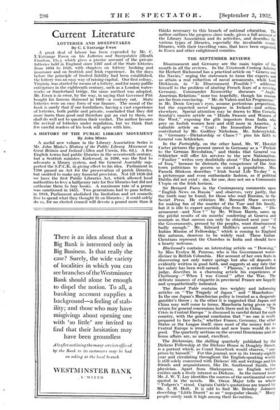THE SEPTEMBER REVIEWS
Disarmament and Germany are the main topics of the month in all the reviews. In the Nineteenth Century Admiral Sir Herbert Richmond has a practical article on " Geneva and the Navies," urging the statesmen to tame the experts and so attain a real reduction of naval armaments, while Lord Dickinson,- in ".Is Disarmament Possible ? " addresses himself to the problem of abating French fears of a reviving Germany. Commander Kenworthy discusses " Anglo- American Relations " none too hopefully, though his reasons are far from convincing. " Mr. de Valera and his Programme," in Mr. Denis Gwynn's eyes, assume portentous proportions, but the expected never happens in Ireland—and seldom elsewhere. Special attention may be drawn to Miss Cornelia Sorabji's caustic article on " Hindu Swamis and Women of the West," exposing the glib impostors from India who prey on foolish women here and still more in America. A valuable article on " Coal : the Immediate Future " is contributed by Mr. Godfrey Nicholson. Mr. Soloveytchik, in " Germany—Dictatorship or Chaos ? " pins his faith to General von Schleicher.
In the Fortnightly, on the other hand, Mr. W. Horsfall Carter pictures the present unrest in Germany as a " Prelude to the German Revolution," and thinks that General von Schleicher will offer his services to the new Nationalism. Fusilier " writes very doubtfully about " The Independence of Iraq," because he distrusts the competence of the Arab town politicians to govern so mixed a population. Miss Pamela Hinkson describes " Irish Social Life To-day " in a picturesque and even enthusiastic fashion, as if political Dublin did not exist : she, for one, does not see a Communist Utopia on the Irish horizon.
Sir Bernard Pares in the Contemporary comments upon " English News on Russia " and observes, very justly, that the truth may be found, for those who read Russian, in the Soviet , Press. He criticizes Mr. Bernard Shaw severely for making fun of the murder of the Tsar and his family, but it is idle to expect anything else from Mr. Shaw. " Dis- armament—and Now ? " by Mr. Wilson Harris, sums up the pitiful results of six months' conferring at Geneva and reminds us that success can only be obtained next year " if the Governments, pressed by the peoples, want disarmament badly enough." Mr. Edward Shillito's account of " An Indian Mission of Fellowship," which is coming to England this autumn, deserves to be widely read. These Indian Christians represent the Churches in India and should have a hearty welcome.
Blackwood's contains an interesting article on " Dowsing," by Miss Evelyn M. Penrose, who is the Government water- diviner in British Columbia. Her account of her own feats in discovering not only water springs but also oil deposits is evidently written in good faith, and suggests at any rate that her salary has been well earned. " Planeus," a retired Indian judge, describes in a charming article his experiences at Cherbourg—" When I was Consul " after the War. The delicate nuances of etiquette in provincial France are happily and sympathetically indicated.
The Round Table contains two weighty and informing articles on " The Tragedy of Japan " and " Manchukuo." In the one Japan's Manchurian policy is treated as a desperate gambler's throw ; in the other it is suggested that Japan and China may well come to terms, Manchuria being given up in return for general concessions both there and in China. " The Crisis in Central Europe " is discussed in careful detail for each - country, with the general conclusion that " no one is really prepared to face facts," whether France, Germany, the other States or the League itself, since most of the money lent to Central Europe is irrecoverable and new loans would do no good. The quarterly sections on the several Dominions and on home affairs are, as usual, excellent.
The Dickensian, the shilling quarterly published by the Dickens Fellowship at the Dickens House in Doughty Street, is a portent which, as Count Smorltork would observe, " sur- prises by himself." For this journal, now in its twenty-eighth year and circulating throughout the English-speaking world, is still solely concerned with Dickens' life and writings and his friends and acquaintances, like Dr. Southwood Smith, the physician. Apart from Shakespeare, no English writer excites such a lively interest as Dickens. In the current issue Mr. J. W. T. Ley identifies the sources of the sentimental songs quoted in the novels. Mr. Owen Major tells us where Todgers's " stood. Captain Cuttle's quotations are traced by Mr. A. H. Holt. It is odd to find Mr. Brimley Johnson describing "Little Dorrit" as an " unpopular classic." Many people surely rank it high among their favourites.






























 Previous page
Previous page